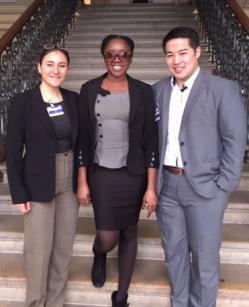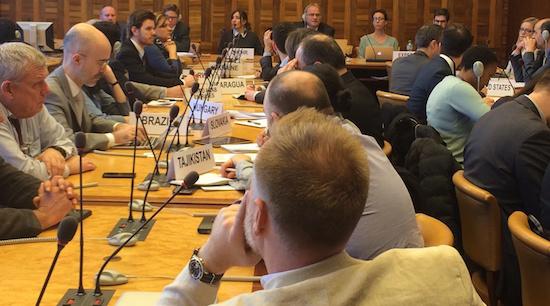Law School's Human Rights Clinic Supports Redrafting and Updating of "Minnesota Protocol"
Draft of New UN Protocol on Legal Obligations and Practical Guidelines for Death Investigations Now Open to the International Community for Public Comment
New York, April 28, 2016—A team of students from the Columbia Law School Human Rights Clinic supported a working group of the world’s foremost legal and forensic experts as they redrafted and updated the “Minnesota Protocol,” a UN manual on the investigation of unlawful killings. Modupe Odele LL.M. ’16, Naomi Prodeau ’17, and Brian Yin ’16 provided extensive legal research, and traveled to the UN in Geneva for drafting sessions with Professor Sarah Knuckey, director of the Human Rights Clinic and chair of the legal redrafting group. A draft of the UN Protocol is now open for public comment.
Brian Yin ’16, Modupe Odele LL.M. ’16, and Naomi Prodeau ’17 (lright to left) at the Palais Wilson in Geneva, Switzerland, the headquarters of the Office of the United Nations High Commissioner for Human Rights. |
The Minnesota Protocol, originally drafted in 1989 by a team of forensics experts and human rights lawyers, has become one of the most important documents setting out the duty of states to investigate killings and providing guidelines on how to do so. It has been endorsed by national, regional, and international courts, as well as regional human rights bodies such as the African Commission on Human and Peoples’ Rights and the UN Human Rights Committee. The Protocol’s redrafting was convened by Christof Heyns, the United Nations Special Rapporteur on extrajudicial, summary, or arbitrary executions, working in collaboration with the UN Office of the High Commissioner for Human Rights.
To support the redrafting effort, the students worked closely with experts from around the world. “We spent hours discussing the exact wording or phrasing that would go into each section because even minor wording choices could have significant legal implications,” said Yin, describing the process. “I was also able to offer some drafting suggestions, which was awesome—all the time we spent as a team studying this area of law last semester really prepared us for this work.”
“It was a pleasure to have the students from Columbia on board,” said Heyns, who is also professor of human rights law at the University of Pretoria in South Africa. “They did extensive and careful background research which helped our discussions greatly, and were able to find creative ways to use technology in order to help facilitate the drafting process in Geneva.”
“The Protocol has become an essential part of international law and practice,” said Knuckey. “The new draft reflects the many important developments in law and forensic science since the Protocol was first drafted, and will help promote best investigative practice worldwide.”
| Professor Sarah Knuckey, director of the Law School’s Human Rights Clinic, pictured (back row, wearing green shirt) at working group drafting sessions in Geneva. |
“Far too often, impunity for killings is the rule,” said clinic student Prodeau. “In our other clinic work, we have seen the harm that poor or no investigations can cause to victims, families, and to the rule of law. We hope this UN Protocol can serve as a tool for accountability, and set a common standard for states to follow.”
“This kind of educational experience is why I came to Columbia Law School, and why I joined the Human Rights Clinic,” said Odele. “I researched various complex areas of law and gained critical drafting skills, especially the skill of expressing legal concepts in concise, clear, and simple language.”
The draft will be open for public comments by civil society, academics, states, and other interested parties until May 23, 2016. For more information, visit the website of the Office of the High Commissioner on Human Rights.
# # #
The Human Rights Clinic is an intensive year-long course directed by Sarah Knuckey, the Lieff Cabraser Associate Clinical Professor of Law and the faculty co-director of the Human Rights Institute at Columbia Law School. The Clinic empowers students to become effective advocates for social justice. For more information, visit http://web.law.columbia.edu/clinics/human-rights-clinic.

